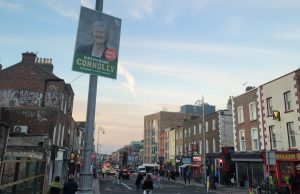
A party built by collective action
Jan Baykara, Daire Ní Chnáimh, and Pete Cannell •Jan Baykara, Daire Ní Chnáimh, and Pete Cannell offer a Scottish perspective on the value of the new party opportunity.
This article was written before recent developments with Your Party and first published in the September/October edition of Scottish Left Review.
People in Scotland, England and Wales have been talking at different speeds and intensities about prospective new left parties and platforms. Now bureaucratic deadlines ahead of the May 2026 Scottish elections have provided impetus to make some decisions. Some discussions have barely begun, particularly in England where attention has fixated on figures like Jeremy Corbyn, Zarah Sultana, Karie Murphy, James Schneider, Roger Hallam and others, with their idiosyncrasies, personal resources, private decisions, secret relationships and guarded statements all fuelling gossip.
The Scottish left is less caught up in this dynamic. Scottish public interest in Your Party is evident in the 65,000 or so signups, with reports of high thousands in Glasgow alone. It is an exciting prospect to collaborate with so many beyond a narrow electoralist project, and that makes it all the more important to prise focus away from secretive deliberations and to engage in broader discussion about party vision and strategy. Election preparation versus movement-building? Party versus federation? Ideological platform versus local issues? A clean break or a broad church? Revolution or reform?
Gauging the value of a new party requires reflecting on the challenges it will confront. Driven by ever accelerating extraction, production and accumulation, our ecological crisis will mean endless new forms of manufactured scarcity. Capitalism’s liberal ideology translates economic scarcity into political discrimination and exclusionary violence. Who gets what? Who has the right to remain. Who can access public funds? Who’s left skint, out in the cold, thrown in prison, or detained pending deportation?
History has exhausted the left’s attempt at that compromise with capitalism called social democracy, with its logic of national universalism, defended by borders and fuelled by regulated international capitalism. Its frail institutions are by now a fading memory. Global capitalism and warfare continue reinforcing border controls and commodifying ever more of life. We are living through the construction of a regime technically prepared for totalitarian measures: pervasive surveillance, preventative policing, and censorship. National facial recognition databases, phone and CCTV networks—enabled in Glasgow by an Israeli miltech company — are joined by social media companies and increasingly by autonomous drones and robotics, which all feed data to the same advanced processing software that the police can use to find, fix and target political protestors, militaries can use to execute freedom fighters and, in a few years, the Home Office will perhaps be using for mass deportations mirroring US Immigration and Customs Enforcement (ICE).
Those driven to the far right are mostly not enamoured by the prospects of a more pervasive state of surveillance and coercion. But in the absence of a viable alternative, the far right is booming internationally with a message of bitter defeatism: “This system is unsustainable. They get this, so we cannot have that. We must be realistic. Harden the state; conserve what we have.” This movement promises an exceptionalist freedom, defining an ‘us’ and excluding a ‘them’ by way of racism, sexism, transphobia, ableism and otherwise. Israel calls for freedom of choice for the Gazans to voluntarily leave their annihilated homeland. The Dutch ‘Party of Freedom’ demands the closure of all mosques. The MAGA movement hails ‘independence day’ and implements border walls, tariffs and mass deportations. The British far right caustically champions free speech to dehumanise and segregate migrants and trans people. Justified by scarcity, their idea of freedom aims at the material disappearance of some sections of us, and parts of all of us, before the whole thing collapses. Now they are winning the political mainstream.
Fill the vacuum
How can we construct an alternative pole of attraction around material freedom? Class power’s radical root is solidarity, not sacrifice. In Scotland, Wales and England we are lumbered with an old regime of relatively unpopular, uncertain political parties, a sparse patchwork of social movements, and a low-density and conflict-avoidant trade union movement, amidst millions of politically disorganised but potently opinionated people. To be sure we can take inspiration from movements, from Black Lives Matter and MeToo to school student climate campaigners and Extinction Rebellion, and now, critically, the movement for Palestinian solidarity which has reached into every corner of society. But they have all bumped into the limits of their own vehicles: they are not integrated deeply enough into a broad, durable project which can move us towards system change.
Meanwhile in Parliament, the Scottish Green strategy of ecosocialism through state elections has yielded just a few seats, reforms and interventions (no doubt useful) and is polling at 4-6 per cent for the 2026 Scottish Parliamentary elections. Their 8,000 membership is dwarfed by the rapidly declining SNP (~58,000). A totally discredited Scottish Labour has ~12,000. People have been wondering if this is all there is.
Now tens of thousands of Scots have signed up to Your Party. In Glasgow, a ‘proto-branch’ has emerged, and a public gathering is scheduled for Friday 5 September ahead of a TUSC-organised conference on 4 October. In Wales and England, more than 50 proto-branches have emerged, and 750,000 people have signed up, with calls across the left for ‘red/green’ electoral pacts and a more-than-electoral project to build working class power. This is a ‘decades in weeks’ period for organised and disorganised leftists alike, where facts on the ground are being made by each next person’s intervention, everywhere. What are we fabricating with this agency?
Not like last time
Many comrades will remember the last rodeo. The energy around indyref in 2014 was a high point of activism and democratic engagement. It seemed like a new and vibrant left might emerge, but in the event, months spent in back room discussion meant that the radical enthusiasm was channelled into the SNP or simply frittered away. The Corbyn movement in Scotland was a weak echo of the much larger movement in the rest of Britain, whose growth was fuelled by similar impulses. You might have joined, gone to some meetings, been sent to knock on doors, signed someone up, who then went to meetings, and was sent to knock on doors, and so on. People were pleasantly surprised at the manifesto, but not involved. Any money raised by the party or Momentum was spent on ads and excruciatingly over-paid management, and all enthusiasm was exhausted in pursuit of a vote to put people in charge, to whom you could then plea in the hopes that they hadn’t already flown into the sun and ceased listening.
Corbynism’scollapse in 2019 demonstrated the weakness of its ‘in and against the state’ strategy. When push came to shove, the social movement that was supposed to guarantee an electoral project was relatively thin on the ground and no match for the regime’s media, PR firms, politicians and bureaucrats. Electoral defeat incurs little cost for the electoral party itself, but causes plenty of disillusionment and frustration for you and your comrades, as you question what power you could have been building with that lost time and energy. Many embittered comrades thought, very fairly: “This is how it goes. This is what it means to organise a party. Let’s not bother.”
We cannot repeat this cycle. There is some consensus that Your Party cannot primarily be an electoral vehicle with its focus on MP figureheads jostling for the media limelight and treading the tightrope of public opinion, nor an endless squabble for party power with entrenched politicians and unelected officials, like fleas jumping in a box. Leaving the old bureaucracy of the Labour Party behind to face the transitional times ahead means a new approach to organisation and power. Election cycles attract attention, but they are just one of many ways to politicise people, and historically have not been a route to systemic change. Socialism, after all, won’t come through parliament. Our aim is system change, not governing the capitalist state at either a local, devolved, or national level, or managing Britain’s imperialist projects and colonial supply chains.
Collective action to counter power
If not through electoral power, then how can a political party effect system change? In the words of the Belgian Workers’ Party amidst its recent growth, the strategic choice is to “materialise counter power … to awaken class consciousness.” Counter power is class autonomy: our capacity to rely on each other in daily life, starting with the fundamentals of food, housing, health, safety and security. Counter power develops as local initiatives are linked regionally and internationally. It is tested by our ability to defend it from state repression and capitalist repossession, and deepens during crises as it comes to be depended upon. Counter power recruits the active participation of much wider layers of people than those currently on the organised left, in and between every workplace, institution and community. Building counter power requires strategy, patience and focus; no shortcuts, but also nothing lost on a bum election.
Imagine what could be started with tens of thousands of people? Your Party members might begin by convening ‘fractions’, for example of school staff and students’ families, and members in paid work might organise fractions for their workplaces, industries, supply chains and unions. One measure of the party’s efficacy would be the growth of rank and file networks across key workforces. Members could seek to reorient unions towards democratised economic planning based on workforces’ and communities’ agreed political priorities. The gradual development of industrial councils, federations of worker co-operatives, and self-governing networks of civil society, such as in education, would indicate a proliferation of popular democracy.
Month-to-month activities of Your Party members might involve gathering grievances about everyday life under capitalism, the state and climate crisis, through social forums, smaller assemblies, canvassing, door-knocking, stalls, phone banking and surveys. Some proto-branches are doing this already. These activities would not be intended to sell ideas, get votes, or sign up members, but to facilitate new relationships through which people can plan collective action. In time, similar to Barcelona en Comú’s municipality assemblies, people could develop the social trust and channel the resources to make and carry out binding decisions about planning, distribution and dispute resolution. As social power builds, we can repossess more of the circulatory systems of economic life from capitalism, and more of the regulatory systems of political life from the state.
When far right agitators call rallies outside a hotel or in the town square, Your Party could gather people before, during and afterwards, to face up to shared material challenges: precarious work, housing, health and social care, unaffordable food and energy bills, and the viciousness of cops, cameras and censorship laws. Assembling alone will not magically reveal an inherently good Peoples’ Politics. Radicals must challenge reactionary positions that creep into common sense. There is no correct line to preach, but a strategic question to answer: what would collective action look like if an injury to one is an injury to all, and not an excuse to sacrifice some to save others? In the infuriating absence of everyday democracy, Your Party could help metabolise the anger of those prone to the far right into a positive, transformative project.
When we reach the limits of our separate community struggles, neighbourhood challenges, and labour and tenant organising, the party can be a revolutionary forum. Locally, regionally and nationally, it can be a place for us to ask each other “What do we have? What do we need? What do we want? And how can we best coordinate?” This could help to thread together the charitable relief efforts of food banks and refuges with the insurance schemes of trade unions, the mutual aid of movement groups with the public services of privatised charities, the institution-building of co-operatives with resistance campaigns like Don’t Pay and We Do Not Comply, the bold militancy of striking workforces with direct actionists and those yet to mobilise or organise. This depth of coordination is most urgently and obviously needed right now to end the genocide of the Palestinian people, who are always just days away from mass starvation, whilst the British state’s posture of basic complicity continues unabated.
If counter power means class autonomy, then Your Party must unequivocally support the right of people in Scotland to self-determination and independence. Scotland has different parties, government structures, health services, laws, and police forces. We will also need organisational autonomy to chart our way through this. But autonomy goes hand in hand with solidarity and a vision shared with comrades in Wales and England of a party of freedom. Not freedom to police people’s gender, racially segregate people into hotels, or pick your preferred-but-compulsory health insurance policy. Rather, a material freedom: from abandonment in childhood, parenthood, sickness, old age and death, from hunger and homelessness, and from policing and carceral punishment for dissent and debt. Westminster, Holyrood and local government are all part of the system which stunts and wrecks working people’s lives — pending abolition.




0 comments